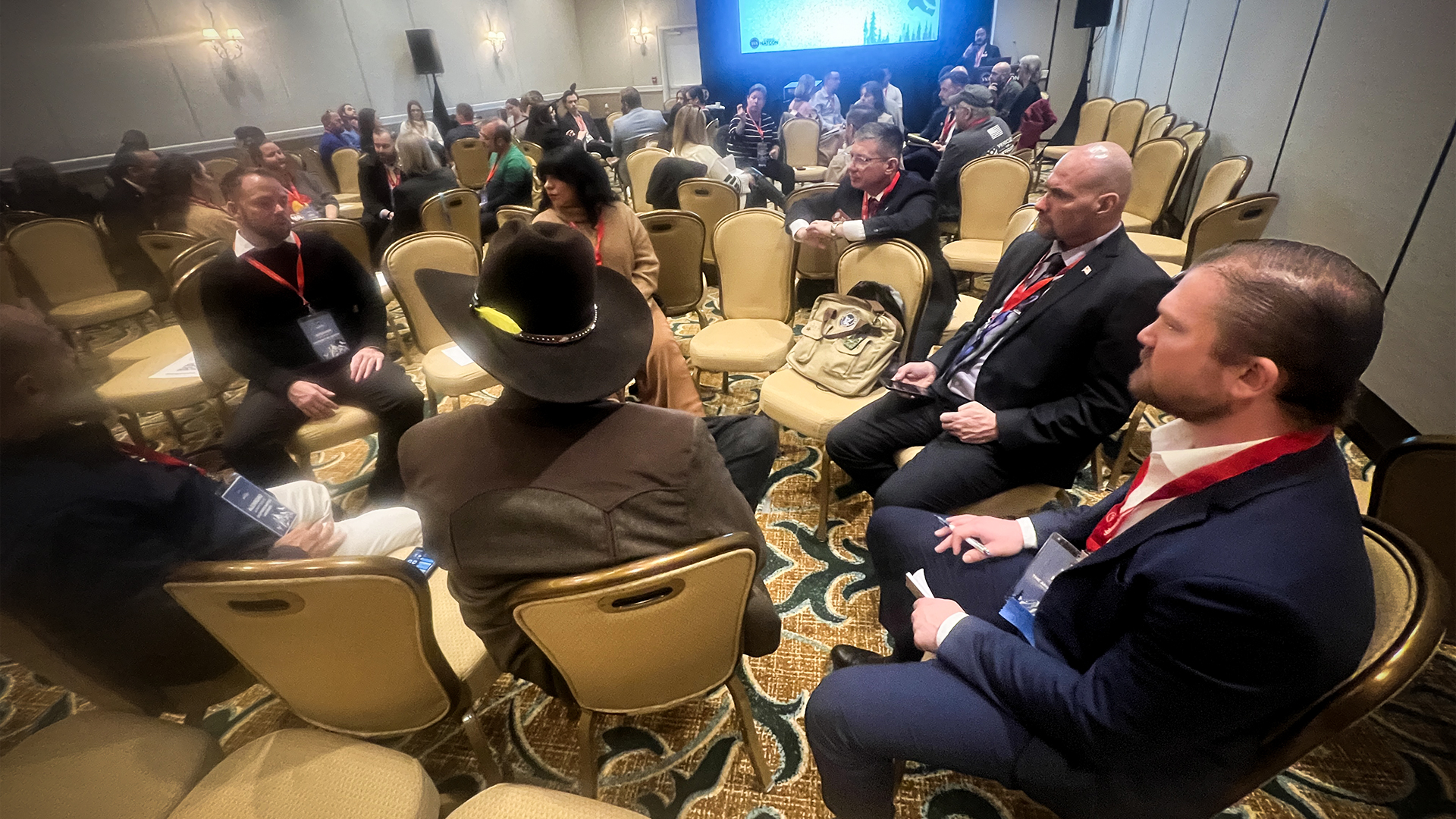
American Legion representatives help student veterans boil down their top concerns heading into 2025.
Colorado Room D of the Broadmoor Hotel Resort Convention Center buzzed with ideas Jan. 4 as the 17th National Conference of Student Veterans of America wound down. The Saturday afternoon session in Colorado Springs was listed as a “Public Policy Think Tank: Empowering Policy for Student Veterans in 2025 and Beyond.”
Eight separate circles of student veterans, advisers and others from across the country – including American Legion representatives – were given few instructions, other than to discuss what’s on their minds and to make a list. Their thoughts were then entered into an app by circle leaders, and a word cloud appeared on a projection screen at the front of the room:
- Childcare
- Mental health
- Transferability of military training for civilian certification
- Standardized requirements for online education
- Continuity of BAH (Basic Allowance for Housing) for students taking online courses and during semester breaks
- Student debt
- Work-study opportunities
- LGBTQ+ inclusivity
- Over-prescription of psychotropic drugs
- Lab fees and other costs
- Observance of Veterans Day on campus
- Dental care
Students representing public, private and faith-based schools large and small from the University of Central Florida to Cornell, the University of Northern Iowa, the University of Wyoming, California Baptist and others, brainstormed and, once their priorities were boiled down to three per group, they stood and explained them to the whole room.
Out of the session, a predominant theme emerged: the financial struggle for a veteran, even with GI Bill benefits, is increasingly difficult. Common complications include the cost of childcare for student veterans, drastic reduction of housing allowances between semesters and during summer breaks and the fast-rising cost of living, in general, forcing most GI Bill users to work full-time or part-time while trying to earn their degrees.
“We all know someone who at some point had to bring a child to class, or just couldn’t do classes because of childcare,” a student veteran from the University of Texas-Austin explained to the group. “So, we would like to see some kind of subsidy, some kind of plan, some kind of idea.”
The dramatic reduction in BAH payments for housing when a student is on break or required to take classes online is just one factor adding to the financial challenge for GI Bill users.
“We need to take a review of what it looks like to live,” SVA Vice President of Government Affairs Tammy Barlet said after the session. “We have seen an increase in living expenses, not only for housing, but also for groceries and other amenities – that everyone needs to live on, just to survive. So, I think we need to look at how drastic that has increased.
“The majority of student veterans are working full or part-time. When do you find time to study? When do you find time for yourself, for mindfulness.”
American Legion Veterans Employment & Education Division Senior Policy Associate Kevin O’Neil, an Air Force veteran, agreed that the economics of getting a degree, even with GI Bill help, are not working in the veteran’s favor as much as they were when the Post 9/11 GI Bill was passed in 2008.
“The current stipend we’re getting, or monthly housing allowance, is not enough,” said O’Neil, a circle leader in the session, who added that he had to work 30 or more hours a week at a restaurant to earn his degree using the GI Bill, and as inflation and housing costs have soared in recent years, the problem has worsened.
“You’re not getting paid for spring break. You’re not getting paid for winter break. You’re not getting paid for the summer months. And it’s really difficult to get a three-month job. We’re not in the 1950s anymore where you can get a lawnmowing job and get paid cash to make ends meet. You’re pretty much relegated to working full time, like I did, 30 to 40 hours a week, and still taking 12 to 18 units.”
O’Neil, who is immersed in issues faced by student veterans every day, said the session brought to his attention one concern he was not aware of – schools that intentionally don’t recognize Veterans Day.
“This appears to be more of a common theme than I would have anticipated,” O’Neil said. “I was shocked to hear that. And I heard something else, regarding cultural competency, that has to do with professors not being attuned to the needs of veterans and the complications they could be facing in the classroom.”
Barlet said the annual think tank helps SVA set priorities for a new year of advocacy in Washington. The 16th SVA NatCon in early 2024, for instance, led to the introduction a bill in Congress to raise the book stipend, which had not been adjusted in over a decade.
“We wait for this (policy think tank) to be complete, and then we release our priorities,” Barlet said.
The format of the think tank appealed to O’Neil, who joined American Legion Veterans Employment & Education Division Director Joe Sharpe and Veterans Affairs & Rehabilitation Division Policy Analyst Andrew Petrie in the Saturday gathering. “It’s interactive. There’s a lot of engagement, whereas you don’t typically get that when you’re on a panel or speaking alone. You may have time for a few questions here and there, but you’re not really engaging with the audience on a level that you would like to, to really learn what the issues are, especially locally.”
Barlet echoed that point to those in attendance, adding that advocacy at the local and state level is equally important as that on Capitol Hill. “All government is local,” she said. “Don’t think all the change happens in D.C. Oftentimes, change happens in your own backyard.”
- Veterans Benefits

